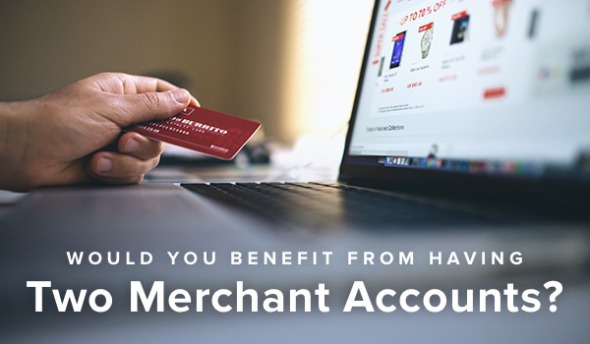
When Do You Need Two Merchant Accounts?

Those of you who accept electronic payments through your website probably have a merchant account that gives you access to a provisional line of credit so that you can quickly and securely process your customers’ credit and debit cards and get paid for your goods and services. Businesses that sell a large inventory of product can benefit from having not one, but two or more merchant accounts in order to get the best rate, security and manage their incoming transactions.
Why open two merchant accounts?
There are many rules and regulations when it comes to processing payments and while there are cases where you will need multiple merchant accounts in order to be underwritten, there are several business reasons to separate your accounts as well. Here are a few other situations when this may be desired:
Merchant agreements are a long and complex subject, and it is important for you to understand the risks associated with your products and talk openly with your payment processing partner to ensure you have the right accounts set up. We invite you to read our in-depth article about credit card processing, and would be happy to put you in touch with our merchant services provider and business partner, Matt Risley at REM Solutions. All website projects with JTech include an analysis of your merchant account to find out the very best setup for your needs. Feel free to give us or Matt a call if you have any questions.
Why open two merchant accounts?
There are many rules and regulations when it comes to processing payments and while there are cases where you will need multiple merchant accounts in order to be underwritten, there are several business reasons to separate your accounts as well. Here are a few other situations when this may be desired:
- Accounts for specific services — Some businesses prefer to separate segments of their business into separate accounts, whether to keep income separate or to keep track of specific products. At JTech, for example, we have a separate merchant account specifically for our clients' domain renewal transactions.
- Avoiding chargebacks — The description listed on a merchant account is typically the same as what will show on a customer’s bank or cardholder statement. If a customer doesn’t recognize the name that appears with the transaction, they may initiate a chargeback (costing you money and time). Some merchants can open another account to help avoid this, making sure to name it something familiar that the cardholder will recognize, which can reduce the risk of disputed charges, keeping their customers at ease when they see their statement.
- Different business models – Businesses accepting payment from more than one location, such as in-store (where the card is usually present) and online (where the physical card is not present.) Depending on the type of business and the products being sold, two merchant accounts might be required by your processor and/or acquiring bank.
Merchant agreements are a long and complex subject, and it is important for you to understand the risks associated with your products and talk openly with your payment processing partner to ensure you have the right accounts set up. We invite you to read our in-depth article about credit card processing, and would be happy to put you in touch with our merchant services provider and business partner, Matt Risley at REM Solutions. All website projects with JTech include an analysis of your merchant account to find out the very best setup for your needs. Feel free to give us or Matt a call if you have any questions.
